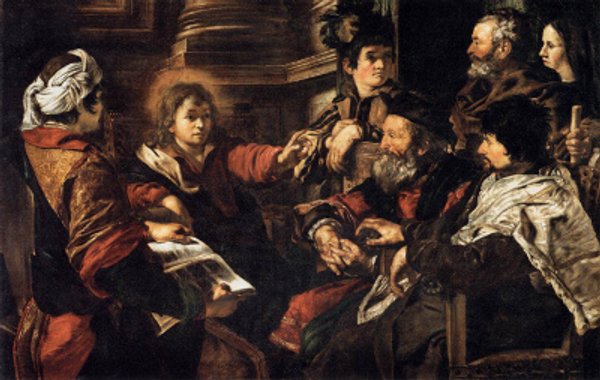The Mosaic Law obliged all the men in Israel to present themselves before the Lord three times a year—at Passover, Pentecost, and on the feast of Tabernacles. This duty did not apply to women, nor to boys under 13, the age when they became subject to the dictates of the Law. Nevertheless, among devout Israelites, women often accompanied their husbands to adore God in Jerusalem, sometimes joined by their children.

In our Lord's time, it was customary that only those who resided within a day's journey made this pilgrimage, and then only for the Passover feast. Since it took several days to reach Jerusalem from Nazareth, the precept did not strictly oblige Joseph. Nevertheless, Joseph and Mary went up to Jerusalem every year for the feast of Passover (Lk 2:41). The Evangelist does not say whether Jesus accompanied them each year, as often happened among devout families. St. Luke mentions Jesus' presence only on this occasion, perhaps to clarify the time frame in the episode he is about to relate, or because Jesus, now in his thirteenth year, could be considered bound by the precept. So when he was twelve, he went with them to the feast (Lk 2:42).
Jerusalem was overflowing with pilgrims and traders. Caravans had come from the most remote regions—the Arabian desert, the shores of the Nile, the mountains of Syria, Jewish cities in Greece…. Confusion reigned everywhere: donkeys, camels, baggage of all sorts filled the streets and outlying areas of the Holy City. And the faithful crowded into the Temple, offering their sacrifices and prayers.
Afterwards, in the confusion of preparing to return homes, men and women sometimes were separated, and the children, depending on their ages, could join one or another group. There was no fixed plan, only the place and approximate time of departure. It is not surprising, then, that when the time came to return, the boy Jesus remained in Jerusalem, and his parents knew it not (Lk 2:43).
We can imagine what our Lady would have been thinking: Was this the sword of sorrow foretold by Simeon that would pierce her own heart?
Mary and Joseph didn't notice his absence until nightfall of the first day on the road, when the caravans returning to Galilee stopped to spend the night. How great must have been their concern when they realized Jesus wasn't there! The hours went by as they looked for him among their relatives and acquaintances (Lk 2:44). With all haste, perhaps that very night, they returned to Jerusalem in search of him. They went back to the place where they had eaten the Paschal lamb and questioned friends and acquaintances along the street. But it was all in vain: no one had seen Jesus. We can imagine what our Lady would have been thinking: was this the sword of sorrow foretold by Simeon that would pierce her own heart?
The second day passed in the same way, amid anxiety and sorrow. They returned again and again to the places they had been, until on the third day the search led them back to the Temple. There they found Jesus, probably in one of the rooms adjoining the atriums where the scribes often instructed the people. It was a frequent scene during festival days: the teacher, from his elevated chair (so as to be seen and heard well) with a roll of the sacred book in his hands, explaining a passage from Scripture to the listeners seated on the floor. From time to time the scribe would pose a question, which one of his brighter students would try to answer. But Joseph and Mary found Jesus: seated in the midst of the doctors, listening to them and asking them questions. On hearing him, they marveled at his wisdom and his answers (Lk 2:46-47).
Our Lady and St. Joseph too on seeing him, wondered (Lk 2:48). But their astonishment was due not to the wisdom of his answers, but because it was the first time Jesus had acted in this way. The most obedient of sons, he had remained in Jerusalem without informing them. He had not been lost; but had left them intentionally.
Son, why have you done so to us? Your father and I have been seeking you anxiously. And he answered them: 'Why have you been seeking me? Did you not know that I must be about my Father's business?' But they did not understand what he said to them (Lk. 2:48-50).
Mary and Joseph, although not understanding Jesus' answer, respected God's plans with complete humility and docility. This is a lesson for all Christians, even if sometimes we fail to understand the workings of divine Providence.
J.A. Loarte
